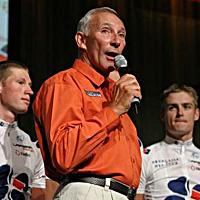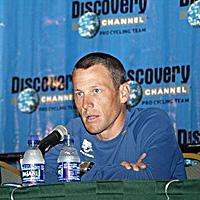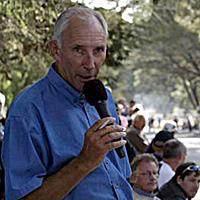
Recently on Cyclingnews.com |
Tour de Georgia feature, April 20, 2006
Liggett's view from the box
Phil Liggett is known round the world for his commentary of the world's biggest bike races; a veteran of the Tour de France press corps, he knows what it takes to make a good bike race. Making an appearance at this year's Tour de Georgia, the 'voice of cycling' believes the absence of Lance Armstrong shouldn't be too big a hurdle for US cycling to jump, as he told Cyclingnews' Kirsten Robbins on a ride around Fayetteville.

|
Those following this year's Tour de Georgia may have noticed a lack of interest and hype surrounding the event compared to the 2005 edition where Lance Armstrong made his final racing appearance on US soil before his swansong Tour de France.
“We need to remember that it [the race] is still in the early stages and the weather has not been our favourite,” said Phil Liggett. “People may tune in a little less for the live coverage at such an early point in the race because the deciding days are about to come. If we allow patience for the unravelling of the stages we will see just how many fans are out, especially for stages like Brasstown Bald."
Liggett is confident that fans will get behind the race as it begins to heat up on the slopes of Brasstown Bald. "I can assure you there will be a lot of people tuning into that stage. They've gained in the last period.”
The retirement of Lance Armstrong certainly had an impact on last year’s event where the then six-time Tour de France champion announced his retirement in the pre-Georgia press conference. “Lance was an important storyline and it appealed to many people,” said Liggett.
“Nobody will take over from Lance and the new riders need to find their own direction. There are many great riders here; from climbers and general classification riders to sprinters, but they have to have another side to their personality to sell to the public," he said.
"That something is not going to be the same story Lance had - it has to be another type of attraction. A great rider has to learn how to appeal to the people. It will be a while to recover from the Lance period just the same as it was for the cycling fans to recover from the Lemond period; he himself was a great rider with a great story. We need to remember that American cycling is growing more and more popular and riders are being noticed here.”

|
For all the talk about US cycling hitting a trough with the retirement of Armstrong, the Tour of California in February and the growing stature of the Tour de Georgia indicate that the spread of American talent in the European pro peloton isn't going unnoticed by American bike fans.
“The Tour de Georgia has been noted to be the Tour de France of America and will continue to grow with more time,” said Liggett. "American events can stand on their own feet now - they don’t need European cycling anymore. Many people have suggested that they become Pro Tour events but this wouldn't be a good idea.
"There are no Pro Tour teams in the US so the riders [from US domestic teams] wouldn't be able to participate. But it's nice that the European racers are now placing priority on races in America and are sending their teams with American riders to compete.”
So, if a residual effect is part of what we are dealing with at the Tour de Georgia, how much time will it take to dissipate? “I think once people are used to Lance’s retirement the races will hold onto the majority of their fans," said Liggett. "Lance is not the biggest attraction for the Tour de Georgia. We have to remember that it is the involvement of the community that really gives the event its life,” he explains.
It's easy to take a stance on the ‘Lance factor’ and its impact on the Tour de Georgia, but it's far more important to notice the greater aspects of the race which keep fans coming back each year.
“My impression is the organisation of the Tour de Georgia has no rivals in Europe,” Liggett said. "The organisation in the US in unbelievable and European athletes really notice this - the organisations do their jobs really well."

|
Liggett cites this year's inaugural Tour of California as an example of how well-organised events in the US impact the scene overall.
"Medallist Sports started the year with the Tour of California and the organisation was fantastic there. And even while Medallist Sports is doing another fantastic job with the Tour de Georgia, we cannot forget how big a role the State [of Georgia] is playing in the race," he said.
"The State is very supportive of this race financially. The crowd will always come to these bike races because each community in Georgia is supporting the event. If you look at how fast Ford picked up the sponsorship after Dodge pulled out; it's amazing that happened so quickly.”
The people who attend any of the pre-race or post-race cities involved in hosting events at the Tour de Georgia are amazed at the array of race-related activities, shops and commentary there is to absorb.
“The expos are letting the community show what they have to offer,” Liggett said, while riding past the expo being taken down from the finish of the first stage. “European races are starting to mimic the US style of event coordination by providing the fans with pre and post-race expos. It's so important to involve the people because the fans want more than just a bike race," he said.
"In the end of a competition you only see the riders for a few minutes and that's not enough satisfy the public; having the race start and finish at an expo is perfect because there are plenty of activities to be had and when the races finish in town that's just the icing on the cake.”
